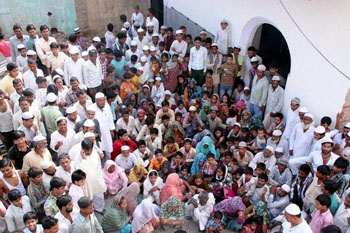 Muzaffarnagar, April 3: The Lok Sabha election has thrown up a new set of challenges for Muslim voters in riot-hit Muzaffarnagar. After facing the brunt of the violence, they are confused and divided over their choice.
Muzaffarnagar, April 3: The Lok Sabha election has thrown up a new set of challenges for Muslim voters in riot-hit Muzaffarnagar. After facing the brunt of the violence, they are confused and divided over their choice.
For Liaquat Ali and Meharban Raza, both Khatauli-based social workers, communal harmony tops the list. “We have lived with Hindus as brothers, the harmony we lost during the September 2013 riots should be restored soon,” they said. Both agreed that the Muslims were equally drawn towards the Samajwadi Party, Bahujan Samaj Party and the Congress, which pitch for secularism.
Voters appear sore at sitting MP Quadir Rana, who has been fielded again by the BSP, for having done little for the district for the past five years. They are also unhappy with Mr. Rana for not acting to stop the riots that claimed the lives of at least 63 people.
Rahis Ahmed and Abdul Aziz, both graduates running shops in Muzaffarnagar, said voters were looking for a candidate who would rehabilitate refugees, still living in temporary shelters in villages between Budhana and Tapur.
Virendra Singh, a former minister and Rashtriya Lok Dal MLA, fielded by the SP, appears to be losing ground as the feeling is that the Akhilesh Yadav government didn’t act swiftly to stop the riots nor did it do enough to rehabilitate victims.
A seasoned politician, Mr. Singh has been trying to convince Muslim voters that it was the SP government that has worked for their welfare. Congress candidate Pankaj Aggarwal, who is Muzaffarnagar Municipal Corporation chairman, hopes to garner votes taking the issue of reservation to Hindu and Muslim Jats. The party has a seat sharing arrangement with Ajit Singh’s RLD, a powerful Jat leader in the region. RLD leaders, including Choudhary Mushtaq, are actively going around villages seeking vote for the Congress nominee.
The BJP’s Sanjeev Baliyan, who supported victims during the riots, is confident of a win.
“My welfare activities during and after the riots and the Modi wave should see me through,” he said while returning from a door-to-door campaign in Jansatt.
However, Ashraf Kazmi of the Jamiat Ulema-e-Hind in Charthawal, laments that parties were trying to woo the riot-hit only for votes and none was bothered about their welfare. He added that none of the candidates has any roadmap in place to rehabilitate the victims, if voted to power.





Comments
Add new comment